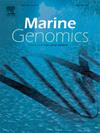Genomic analysis of Pseudoalteromonas sp. SD03 reveals its potential in chitin hydrolysis
IF 1.5
4区 生物学
Q4 GENETICS & HEREDITY
引用次数: 0
Abstract
Pseudoalteromonas sp. SD03, a marine bacterium capable of chitin degradation, was isolated from Antarctic surface water. Here, the genome of strain SD03 was sequenced and the chitin metabolic pathways were constructed. The genome of strain SD03 contained two circular chromosomes and one plasmid totaling 4,326,719 bp with a G + C content of 40.27%. A total of 4005 protein-coding sequences were predicted. Gene annotation and metabolic pathway reconstruction confirmed that strain SD03 possessed intact gene clusters for the hydrolytic chitin degradation pathway. Chitin represents the predominant polysaccharide in marine ecosystems. The degradation and recycling of chitin, mediated by marine bacteria, underpin critical biogeochemical cycling processes of carbon and nitrogen in marine environments. The genomic information of strain SD03 revealed its genetic potential involved in chitin metabolism. The strain SD03 could grow with colloidal chitin as the sole carbon source, indicating that these genes would have functions in chitin degradation and utilization. These findings provide genomic insights into the biogeochemical cycling of marine chitin in polar environments.
假异单胞菌sp. SD03的基因组分析揭示了其在几丁质水解中的潜力
从南极地表水中分离到一种能降解几丁质的海洋细菌假互生单胞菌sp. SD03。本研究对菌株SD03的基因组进行了测序,并构建了几丁质代谢途径。菌株SD03基因组包含2条环状染色体和1个质粒,总长度为4,326,719 bp, G + C含量为40.27%。共预测4005个蛋白编码序列。基因注释和代谢途径重建证实菌株SD03具有完整的水解几丁质降解途径基因簇。几丁质是海洋生态系统中主要的多糖。海洋细菌介导的几丁质降解和再循环是海洋环境中关键的碳氮生物地球化学循环过程的基础。菌株SD03的基因组信息揭示了其参与几丁质代谢的遗传潜力。菌株SD03能够以胶体几丁质为唯一碳源生长,说明这些基因可能在几丁质降解和利用中起作用。这些发现为极地环境中海洋几丁质的生物地球化学循环提供了基因组学的见解。
本文章由计算机程序翻译,如有差异,请以英文原文为准。
求助全文
约1分钟内获得全文
求助全文
来源期刊

Marine genomics
生物-遗传学
CiteScore
3.60
自引率
5.30%
发文量
50
审稿时长
29 days
期刊介绍:
The journal publishes papers on all functional and evolutionary aspects of genes, chromatin, chromosomes and (meta)genomes of marine (and freshwater) organisms. It deals with new genome-enabled insights into the broader framework of environmental science. Topics within the scope of this journal include:
• Population genomics and ecology
• Evolutionary and developmental genomics
• Comparative genomics
• Metagenomics
• Environmental genomics
• Systems biology
More specific topics include: geographic and phylogenomic characterization of aquatic organisms, metabolic capacities and pathways of organisms and communities, biogeochemical cycles, genomics and integrative approaches applied to microbial ecology including (meta)transcriptomics and (meta)proteomics, tracking of infectious diseases, environmental stress, global climate change and ecosystem modelling.
 求助内容:
求助内容: 应助结果提醒方式:
应助结果提醒方式:


